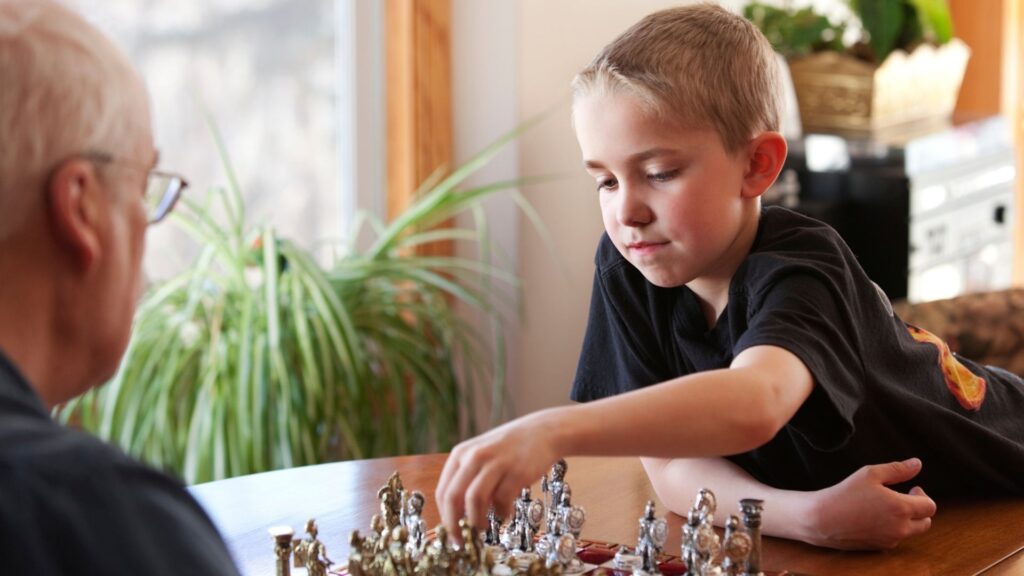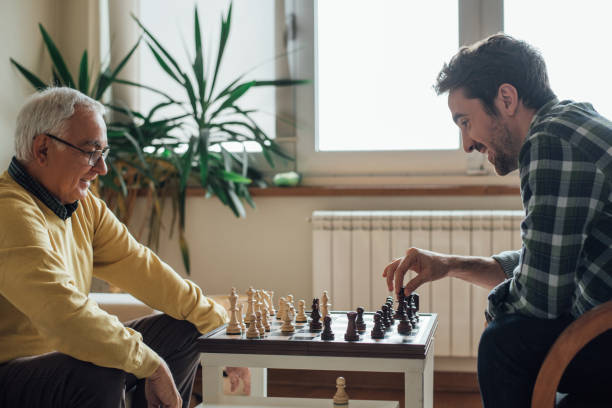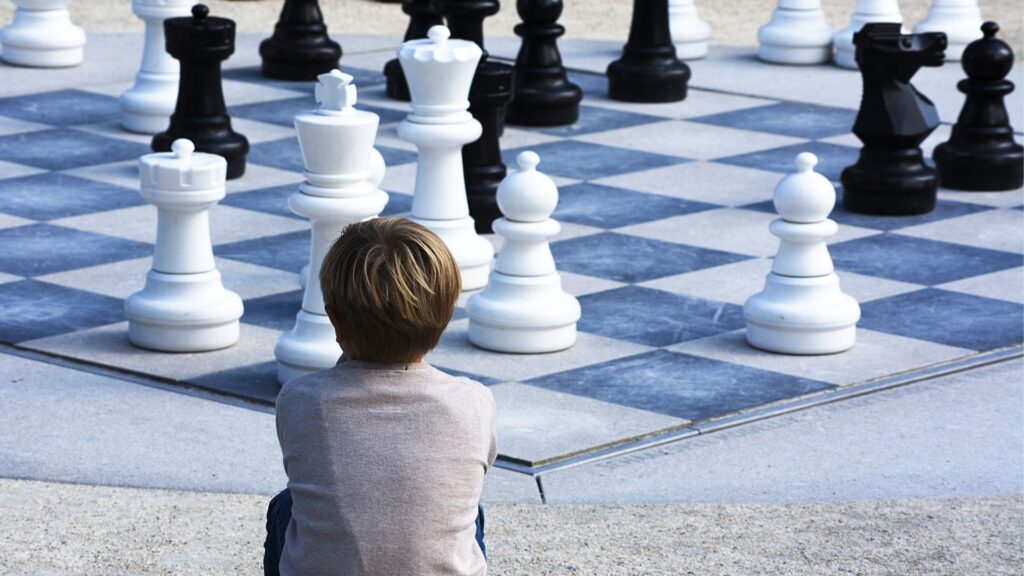When my six-year-old grandson watches me play chess, he often offers his input when it comes to making moves. However, because of how young he is, his mother and I have been discussing what age does one needs to be in order to learn chess.
Some experts say that children as young as five years old can start learning and playing the game, while others believe that starting at a later age, seven or eight can be more beneficial. That’s because older children and adults have better problem-solving skills than adolescents to learn chess
Chess is a popular board game that people of all ages can enjoy. But what is the best age to learn chess? There seems to be no consensus, so let’s take a closer look at both sides of this debate.

Contents
The Best Age to Teach Your Child Chess
Chess may not be the easiest game to learn, but it’s far from the hardest. The rules of chess are simple to understand, although the game is complex to master. Chess can be learned at any age. To learn a language or start playing football, the younger a person is, the better.
On the other hand, there is no best age to learn chess or start playing chess. It is always possible to learn chess! Chess is a game of strategy and it really stimulates the brain of the player. For this reason, it is recommended for anyone of any age, from children to the elderly.
Many of the great world champions, for example, started their lives as chess players very early, always encouraged by their families. The truth is, there is no best age to learn chess or start playing chess. If you want to learn, whatever your age group, there is always time to start and benefit greatly from everything the sport brings.
Learning chess brings many benefits to children, as the game improves various skills such as concentration, logic, strategy formulation, and creativity. To tell the truth, the best chess players in history started at an early age.
With its many amazing benefits, it is recommended to start teaching your kids chess early in life. Many chess prodigies have shown their brilliance at a young age before winning World Championships later in life, like Fischer, Carlsen, and Capablanca.
However, it seems hard to decide what the best age is to teach the basics of chess because some children start learning chess at a very young age( 4 Years) and others when they are 6 years or older.
In addition, at this age, they enter third childhood, a phase marked by the broader development of cognition — which is the ability to learn, memorize, use, and reflect on more complex information and knowledge.
Since every child is unique, there are no set parameters for learning chess for a specific age group, but an ideal age to start is between seven to eight years. As a general rule, we can say, the earlier you begin, the better off you will be.
Can you be Too old to Learn Chess?
You never get too old to learn chess. Depending on your age, it may be more difficult to learn many things, including chess. However, it is relatively easy to learn chess and is a fun past-time. However, don’t expect to become a grand champion if you start learning later in life because it takes time to learn chess and to play it at a high-level.
Most chess games last a long time. When we grow older, it becomes difficult to focus for long periods of time without getting tired or distracted by other things. As our mental tolerance weakens and physical stamina decreases with age it becomes more difficult for the elderly to compete against younger people in chess.
Do Chess Players Get Worse with Age?
There is a close association of chess players with the age as being a natural process. The chess player gets worse with the increasing age. Because of chess tournaments, most people are unaware that chess is not only mental but also physical.
They think chess is merely a game, a recreational activity, and a pleasant diversion for them. However, it can become an all-consuming, compulsive hobby for some people, costing them time and energy.
It can cause problems at school, work, and with one’s health. Before the age of 20, performance on the chessboard seems to increase rapidly. From that age on, ability then seems to plateau around age 35, peak at age 40, and decline steadily after age 45. Chess rating slides as the person gets older.
Also, you will be compelled to sit for long periods with little rest. That can weaken your backbone. When you play it regularly, your desire converts into an addiction, so it’s difficult to do your work when you want to play it.
Benefits of playing chess later in life
Chess is a complex game that requires strategy, calculation, and foresight. It’s no wonder why many people believe that chess players peak at a later age. In fact, there are many benefits to learn chess and playing later in life. Some of these benefits include:
- Improved memory and cognitive function
- Increased problem solving skills
- Improved hand eye coordination
- Reduced risk of Alzheimer’s disease and dementia
So if you’re looking for an activity to keep your mind sharp as you get older, learn chess now! Not only will you be able to improve your mental abilities, but you’ll also have the opportunity to meet new friends and compete in tournaments. What more could you ask for?
What Age do Chess Players Peak?

Do you know what age chess players peak? Studies have shown that the average chess player reaches their peak at around the age of 33. However, this number can vary depending on a person’s ability and experience.
Much research on cognitive performance tends to be based on skills such as decision speed and working memory, but chess is different because it also depends on training and experience.
Over the course of a career, most players were found to peak in their early 30s, maintaining that performance for about 10 years before their ability at the game deteriorated. Like age, there is another factor that impacts the peak reach of a chess player and that is experience.
Among thousands of less experienced players, for example, performance increased sharply until about the age of 37. This suggests that experience can alter the age at which someone peaks, and this could explain why, over the last century, chess players have been peaking earlier and earlier.
However, some chess experts believe that the most top-rated chess players peak between ages 35 to 40. The variations greatly depend on the player’s relative strength and playing strength, which is directly associated with the early peak.

Youngest Chess Grandmaster 2021
The American chess prodigy Abhimanyu Mishra became the youngest chess Grandmaster in 2021 in history at just 12 years, four months, and 25 days, a distinction that for 19 years belonged to the Russian Sergei Kariakin, who achieved it at 12 years and seven months.
The talented young man reached the highest category of the specialty after achieving his third Grand Master (GM) norm in Budapest, the capital of Hungary, a title that is awarded for a high level of performance in a high-class chess tournament, beating Indian competitor Leon Mendonca in the Vezerkepzo GM Mix tournament.
Mishra became the youngest person to hold the titles of US National Master, International Master, and Grandmaster of chess, which he achieved at 9, 10, and 12 years of age, respectively.
Average Age of Chess Grandmasters
The average age to become a chess grandmaster is just above 28. This concept came in 1950, and some old players got honored meanwhile. However, there are some absolute variations showing the average age of a chess master as for the players born after 1945, the average age is 26 years above.
For the ones who took birth after 1970, the average age is 23 years. Similarly, for the ones who took birth after 1980, the average age is 21 years. And for those who were born after 1990, the average age to become a chess grandmaster is just 18.5 years.
Apparently, players are becoming chess grandmasters much faster nowadays. Many countries have shown the chess grandmasters in their early twenties, as India and China have come up producing grandmasters on average both at 21 years of age.
FAQ
Can you learn chess at any age?
Yes, you can learn chess at any age and have fun playing. However, if you start playing late in life don’t expect to be a competitive tournament chess player.
Does chess increase IQ?
There are no studies that confirm chess makes a person smarter or increases IQ, however, it does improve problem-solving skills. For some individuals chess is beneficial and for others, it could cause be a stress inducer and become harmful.
Conclusion
Chess is a game that can be enjoyed by people of all ages, and it’s never too late to learn chess. if you want to give your child or yourself an edge in life, let your child learn chess. And if you’re hesitant about starting because you think you might be too old, don’t worry – even at 81 years old, Vasily Smyslov became the oldest person ever to become a world champion. Thanks for reading!
